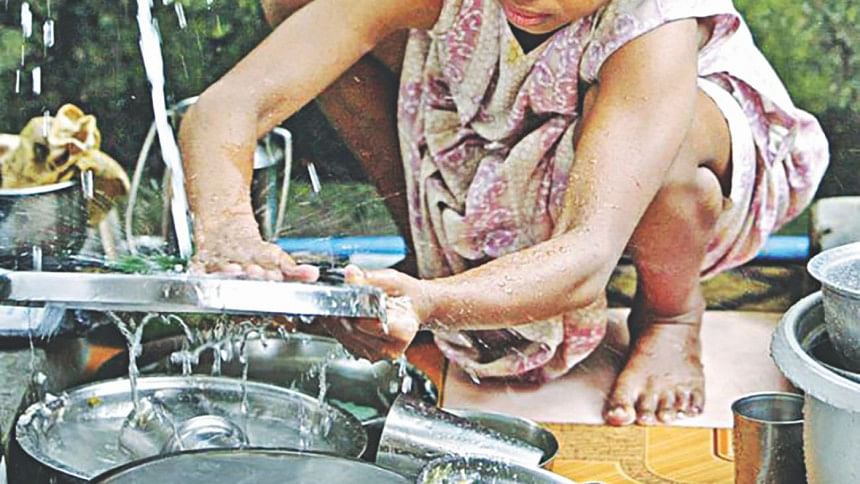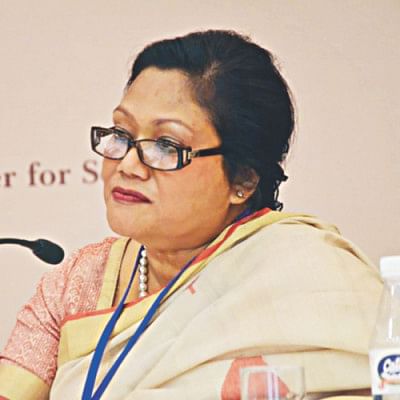Legal system needs to be more child-friendly

One of the most pressing and least addressed problems facing the nation currently is the increasing violence against children. Some children, such as those engaged in domestic work, are more vulnerable to abuse than others. Shagufe Hossain of The Daily Star talks to Salma Ali, Executive Director of Bangladesh National Women Lawyers' Association, to further explore the issue.
In your opinion, what are some of the most common reasons contributing to the rise in violence against children?
It is a good time to bring up this topic. We have just received a judgement for a case involving a four-year-old who was raped in Keraniganj in 2015. So, I am feeling optimistic that as a nation, we have the resources to hold people accountable for their actions. Personally, I am particularly bothered by sexual violence committed against children. When cases like this are brought to court, matters of victim and witness protection must be kept in mind, which is a challenge. Cases where violent acts have been committed against children are sensitive, and require that the public prosecutor, police and judges work together with full commitment towards ensuring justice. Also, all those who are involved need to have a specialised set of skills to enable courtrooms to be more child-friendly.
But to answer your question, in my experience, there is no one reason that children are victims of sexual violence. If I were to state the biggest cause, it is the fact that women and children, especially girls, are still seen as lesser human beings. Children who see their mothers being abused at home often develop the mindset that women are "supposed" to be subjected to ill-treatment. The girl child grows up thinking she "deserves" to be abused because she is female. The boy child grows up thinking he has a right to abuse women because he is male. This social inequality is ingrained in the psyche and then becomes a cycle. There is also an erosion of social values. Drugs and pornography are so easily accessible. Crimes are not seen as crimes, violence not seen as a punishable offence. The powerful are rarely held accountable for their actions. Combined with a patriarchal mindset, this moral erosion is outright dangerous.
In what situations do you think the children are most vulnerable to violence and abuse?
I think adolescent girls who are engaged in domestic work are the most vulnerable. If you think about it, a young girl moves far away from her family to work with a family she knows nothing of, moving in with complete strangers. In such a situation, both her physical and mental wellbeing are dangerously at stake. These children don't even have separate quarters and if they do, they are usually in the darkest corner of the house. And at an age when they need it the most, they have nobody looking out for them.

The government approved the Domestic Workers Protection and Welfare Policy in 2015. However, implementation of the policy remains limited. Why is it so?
For any policy to be effectively implemented, the supporting infrastructure needs to be strengthened. While we see significant political will and commitment, coordination among different ministries such as the Ministry of Women and Children Affairs, Ministry of Labour, the city corporations, etc. would make the process much smoother. There needs to be a monitoring mechanism to check if the policies are being implemented. Better yet, steps towards ensuring that children don't have to be engaged in domestic work should be taken. However, it's not solely the governments' responsibility to ensure successful implementation of laws and policies. In case of Aduri, for example, the media was so alert, the public were so outraged, that the perpetrators were held accountable for their actions. There needs to be at least as much attention given to other cases as well. The judicial system really needs to be child-friendly and so does the mindset of the people so that legal systems that hold perpetrators accountable can be effective.
Speaking of legal reforms, I think we have come a long way. What we need to focus on now is the implementation of the frameworks that are in place and building awareness of the laws that exist. Most people are not aware of the laws related to children's safety. Our approach should be more proactive rather than reactive to ensure the safety of the children.
Aside from the implementation of legal frameworks, is there a role that the private sector can play in reducing vulnerability of the children engaged in domestic work?
Of course! The private sector has a huge role to play. I think if the private sector invested some of its funding as Corporate Social Responsibility to take on some sustainable projects aimed at ensuring the safety of children, especially those engaged in domestic work, progress could be more easily achieved. Also, if we are to have help at home, they should at least have their own quarters. Both buyers and sellers of apartments need to take into account that if the culture in Bangladesh is such that we must have domestic help, living spaces should be designed to accommodate for them.
A legal framework is important, of course. The fact that domestic workers don't have formal recognition is problematic. Those who are employed in the ready-made garments sector, for example, have formal recognition and so are respected. But those who are engaged in domestic work don't have their work valued. Because they have no formal recognition, they have no respect. So children as young as 12-year-olds become victims of forced labour and even bonded labour. We all need to work together to ensure a healthy environment for our children.
***
One Aduri is one too many. But sadly, it doesn't begin or end with Aduri. We have had Rajons, Rakibuls and most recently Sabina, an 11-year-old subjected to gruesome abuse. It is high time that measures be taken to not only curb the culture of impunity that is the aftermath of abuse, but also build a society where there is no room for cases like this to occur.





Comments